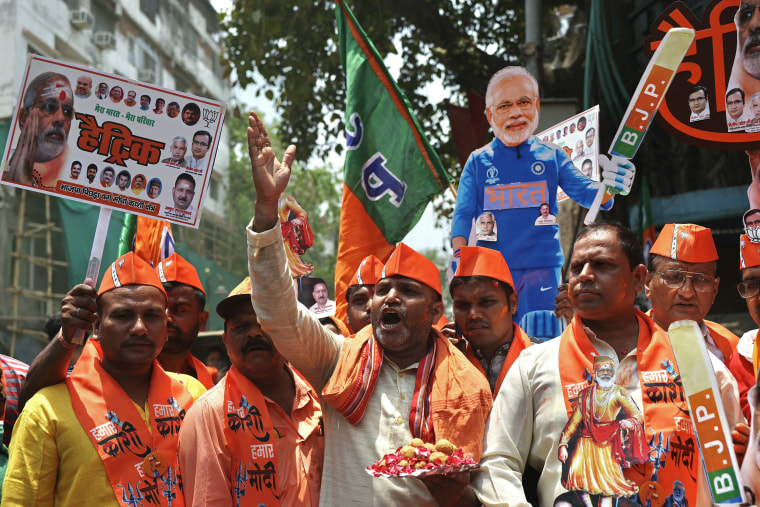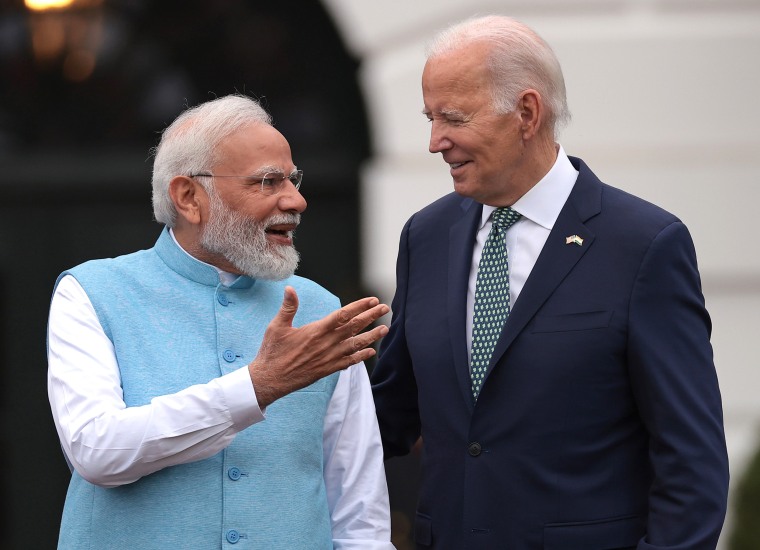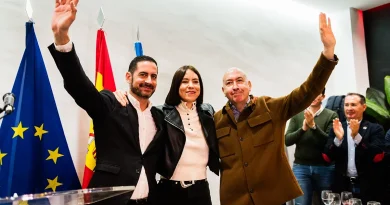Modi’s alliance has early lead in India election vote count
VARANASI, India — Early vote counting suggests Indian Prime Minister Narendra Modi will win a rare third term on Tuesday, entering a new decade as leader of the world’s most populous country at a time when India is growing closer to the U.S. and gaining clout around the world.
Modi enjoys wide support both at home and among the large Indian diaspora in the U.S. and elsewhere, with voters rewarding a leader they see as responsible for India’s rocketing economy and rising confidence on the world stage. According to Morning Consult, Modi is by far the world’s most popular leader, with an approval rating of 74%.
His Hindu nationalist Bharatiya Janata Party and allied parties appeared to have secured almost 300 of 543 seats in Parliament, according to early results, giving them a simple majority. But the opposition was doing better than expected in an election that exit polls had suggested Modi’s alliance would win by a landslide.
But critics say Modi has also eroded human rights in India, the world’s largest democracy, and stoked religious tensions, particularly against India’s Muslim minority, with Modi and other BJP candidates accused of hate speech and other inflammatory rhetoric during the campaign. India is also struggling to provide enough jobs for its 1.4 billion people, despite being the world’s fastest-growing major economy.
Modi’s ethos of a Hindu-first nation is now deeply entrenched in Indian politics, raising fears among Muslims and other minority groups over how they will fare during five more years of Modi rule.
In Modi’s home seat of Varanasi, which voted Saturday in the last of seven phases of voting, Tasneem Fatma walked out of a polling station wearing a burqa, saying, “We want a united India, not for Hindu, Muslim, Sikh, Isai.”
But Fatma, 20, a business student, was interrupted by an older man who said there was no religious divide. He also dismissed Fatma’s concerns about unemployment, saying, “If you are educated and if you are capable of the job, you can take the job.”
As the discussion grew more heated, police officers asked the man to leave before NBC News could ask for his name.
India’s election is considered the world’s largest, with nearly a billion registered voters and polling that spanned over six weeks. But it was not just the sheer size of the election that posed a challenge for officials.
Voting has taken place amid unusually high temperatures that have exceeded 120 degrees in New Delhi, the capital, and experts say that may have depressed turnout. At least 33 people in three states died of suspected heatstroke just on Friday, Reuters reported, including election officials who were on duty.
Although Indian summers are generally hot, scientists say heat waves in India and elsewhere in South Asia are becoming hotter, longer and more frequent at least partly as a result of climate change. Neither the BJP nor the opposition has said much about climate change during the campaign.
The issue foremost in the minds of voters who spoke with NBC News was jobs. It’s an especially big worry for those ages 15 to 29, who make up 83% of unemployed people in India, according to a report in March.
“Why is nobody talking about rising costs or lack of jobs or poor kids dying or trees being cut?” Fatma asked.
India’s opposition parties, led by the Indian National Congress, have tried to use such issues to drive voters away from Modi. Aware of the gargantuan effort it would take to defeat him, the fractured opposition formed an alliance that quickly faltered.

Opposition parties have also accused Modi’s government of trying to stifle their campaigns by arresting their leaders and freezing their funds, allegations the BJP denies. Arvind Kejriwal, a vocal Modi opponent who is the chief minister of New Delhi, was arrested in March in connection with corruption allegations, and he returned to jail Sunday after he was granted interim bail in order to campaign. He denies the charges.
Today’s India is run by “a very strong, dominant BJP, which in 1984 had only got four seats in Parliament,” said Yamini Aiyar, former chief executive of the Center for Policy Research, a highly regarded think tank in New Delhi that has been targeted by a Modi government crackdown on civil society.
In recent years especially, she said, the BJP has become “creepingly authoritarian.”
“Our democracy is at stake,” Aiyar said.
According to Freedom House, a nonprofit pro-democracy organization in Washington, elections in India are generally considered free and fair, but they are being held in an environment in which freedom of expression is shrinking. It cited the arrests and prosecutions of journalists, information manipulation using artificial intelligence and other technologies, and Indian authorities’ demands that social media companies remove online content critical of the government, among other issues.
Modi’s shaky rights record can make things awkward for Washington, which views India as an important counterweight to China. Though India is not a formal U.S. ally, it is an important defense partner and a member of strategic security groupings such as the Quad, which also includes the U.S., Australia and Japan.
Modi, who rarely takes live questions from journalists, pushed back against criticism at a joint news conference with President Joe Biden during a state visit to Washington last year.

“In India’s democratic values, there’s absolutely no discrimination, neither on basis of caste, creed or age or any kind of geographic location,” he said.
U.S. authorities also say Indian agents may have been involved in the attempted assassination last year of a Sikh activist living in New York. India denies the allegations, saying such a crime would be “contrary to government policy.”
Experts say the U.S. relationship with Modi will continue to strengthen, regardless of who wins the U.S. presidential election in November.
“China remains the elephant in the room or the presence that is shaping the alignments and realignments across the world,” Aiyar said.




